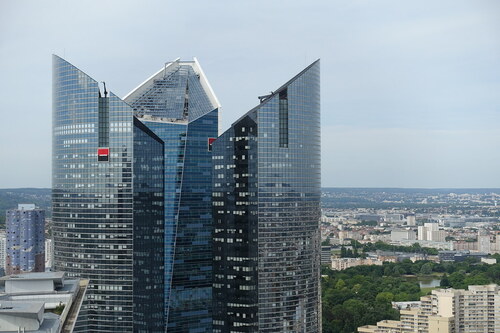Une perte de 537 millions d’euros pour les activités de BFI
Alors que la banque de La Défense devait dévoiler ses comptes le 6 mai, elle a avancé la publication au 30 avril pour « couper court aux rumeurs de marché dans un environnement déjà très incertain », comme l’a précisé son directeur général, Frédéric Oudéa, lors d’une conférence de presse téléphonique.
Affectées par la dislocation des marchés en mars et l’annulation des paiements de dividendes, les activités de banque de financement et d’investissement (BFI) affichent une lourde perte de 537 millions d’euros, contre un bénéfice de 140 millions d’euros un an plus tôt. Les activités de dérivés sur dividendes ont été particulièrement impactées, avec une perte à 200 millions d’euros.
Sur le 1er trimestre 2020, la hausse des provisions de la BFI a fait chuter ses revenus de 175 millions d’euros.
Des cas de fraude connus du marché
Le coût du risque de Société Générale a atteint 821 millions d’euros (65 points de base) au 1er trimestre, contre 264 millions d’euros (21 points de base) sur la même période l’année dernière. Cette augmentation s’explique par la hausse des provisions pour faire face à la crise du Covid-19, mais également par l’implication de l’établissement dans deux cas de fraude connus du marché. La banque a notamment évoqué une « charge importante » liée à un client basé à Singapour qui pourrait être Hin Leong Trading, un géant des hydrocarbures principalement présent dans le courtage et le stockage de pétrole. Celui-ci est soupçonné d’avoir dissimulé des centaines de millions de dollars de pertes sur plusieurs années.
Une forte hausse du coût du risque en 2020
Le groupe anticipe désormais un coût du risque d’environ 70 points de base pour l’année 2020 dans l’hypothèse où la pandémie se traduirait par une baisse du produit intérieur brut (PIB) de 5,8 % en France, 6,8 % au sein de la zone euro, et de 2,3 % dans le monde en 2020. Dans un communiqué, Société Générale indique que le coût du risque pourrait grimper à 100 points de base dans un scénario impliquant une baisse de PIB de 11,1 %, 12,8 % et 7,8 %, respectivement en France, en zone euro et dans le monde.
Malgré ses résultats, la banque française se veut rassurante sur son assise financière avec un ratio de fonds propres « durs » s’établissant à 12,6 % en mars, bien supérieur aux exigences réglementaires. Elle a par ailleurs annoncé un effort de réduction de coût de 600 à 700 millions d’euros en 2020.
